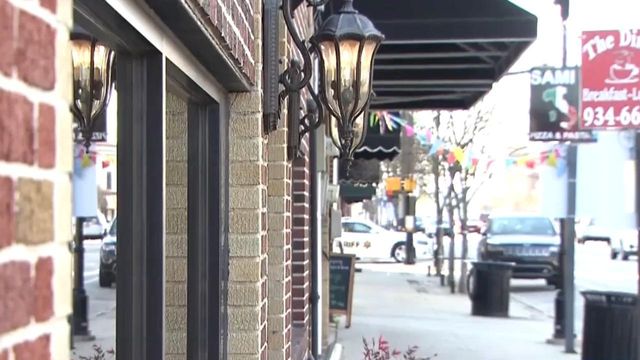NC governor issues statewide stay-at-home order
Faced with a growing number of cities and counties across North Carolina enacting local stay-at-home orders to curb the spread of the new coronavirus, Gov. Roy Cooper on Friday issued a statewide order.
Posted — Updated"It's what we have to do to save lives," Cooper said at a news conference. "These are tough directives, but I need you to take them seriously. Although we're physically apart, we must take these steps together in spirit."
The order will take effect at 5 p.m. Monday and will run for 30 days.
What the stay-at-home order means
- Gatherings of more than 10 people are prohibited, although that limit doesn't apply to shopping centers, medical facilities and airports. Up to 50 people are allowed at funerals.
- People can go out to buy groceries, pick up prescriptions, visit a health care provider, exercise, care for family members, volunteer to serve the needy or visit a place of worship.
- "Essential" businesses that can continue to operate include health care providers, supermarkets, pharmacies, gas stations, law enforcement, utilities, maintenance workers, human services organizations, farms and other food and beverage producers, banks and insurers, shipping, transportation, hotels, mortuaries and professional services, such as lawyers and accountants.
- Restaurants can continue to provide drive-thru, takeout and delivery services.
- Pet supply stores, electronics stores, lawn and garden shops, liquor stores and bookstores that sell education materials also can remain open.
- All businesses that operate need to practice "social distancing" among employees and customers.
- Violations of the order are punishable as a Class 2 misdemeanor.
Twenty-three other governors had issued stay-at-home orders, but Cooper was hesitant to pull the trigger in North Carolina.
"When we put a statewide order in place, it's in place for everyone – rural and urban," he told WRAL News on Thursday, when more than one-third of the state's 100 counties still hadn't reported a single case of COVID-19.
He said at the time that his public health and safety officials were still gathering data that would eventually lead to more restrictions.
On Friday, the governor noted that the Centers for Disease Control and Prevention rates North Carolina as having "widespread transmission" of the virus.
"Because no one is immune, because there is no vaccination, the best scientifically proven tool we have to slow the spread is keeping our physical distance and staying at home," he said.
Senate President Pro Tem Phil Berger quickly criticized the stay-at-home order, saying the state should have collected data from more testing to justify it.
"Government leaders are making decisions without the benefit of relevant and obtainable data. Unfortunately, they don’t know how prevalent the virus is and has been in the population. Therefore, we do not have sufficient, reliable information to understand true hospitalization and fatality rates," Berger, R-Rockingham, said in a statement.
"We owe it to the hundreds of thousands of newly unemployed North Carolinians to check the math," he said. "If the true data supports the most stringent measures, then presenting that data to the public will increase compliance and confidence in government. If the data does not provide such support, then easing of current restrictions will be possible to do safely."
Dr. Mandy Cohen, secretary of the state Department of Health and Human Services, said state officials "cannot wait for the perfect information to move forward" with the stay-at-home order.
"What we know is that we need less people to get sick at the same time so that we don't overwhelm the capacity of our medical system," Cohen said. "I urge everyone to be staying at home, to abide by these orders so that we have less spreading of the virus."
Republican U.S. Sen. Thom Tillis, who has often butted heads with Cooper in the past, called the stay-at-home order the right decision.
"We are all in this together, and in order to protect the health of North Carolinians and get through this crisis as quickly as possible, we must all do our part to contain community spread over the next several weeks," Tillis said in a statement. "I’m glad this order allows essential industries to continue their important work while also providing flexibility to North Carolina businesses that are able to practice social distancing and maintain a safe and healthy work environment to protect their employees and the general public."
Cooper said he would do whatever necessary to help people who lost their jobs or were otherwise hurt by the restrictions.
"Losing your job or closing your business has to be difficult, but we have to act now in the safest, smartest way while we have the chance to save lives," he said. "It is truly a matter of life and death."
Cooper said any local orders that impose stricter conditions than those included in his statewide order would be in effect. He said he hopes no one has to be charged with a crime for violating any of the orders.
"What we want law enforcement to do is to encourage people to abide by the order, and if they see people who aren't, to encourage them to do it," he said.
Related Topics
• Credits
Copyright 2024 by Capitol Broadcasting Company. All rights reserved. This material may not be published, broadcast, rewritten or redistributed.






